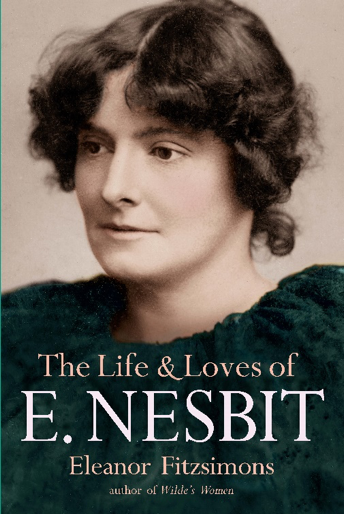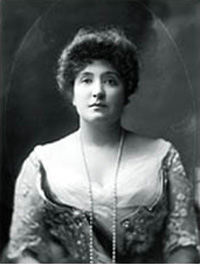I’m really pleased that Wilde’s Women is still being reviewed 18 months after publication. I’m particularly delighted that a Wildean scholar of the calibre of Professor Peter Raby reviewed it for Women’s Studies, a highly regarded, peer-reviewed journal. ‘The author writes sympathetically & vividly about Lady Wilde, as she does about Wilde’s wife, Constance,’ Raby writes.
In response, here is an extract that describes the admiration Jane Wilde had for Scandinavian women and the freedoms they were afforded:
Shortly after [her daughter] Isola arrived, Jane formed an extremely significant friendship with a progressive young Swedish woman named Charlotte ‘Lotten’ von Kraemer. Then, as now, Scandinavians took a more enlightened approach to gender equality and Jane’s admiration demonstrates how far ahead of her time she was. It must be remembered that many Victorian women were complicit in their subjugation, propping up male-dominated institutions that kept them down and shunning women who objected.

Lotten von Kraemer
As Lotten suffered from a painful and debilitating ailment of the ear, triggered by a bout of scarlet fever in adolescence, she had been advised to consult Dr. William Wilde, one of Europe’s leading aural specialists. She and her father, Baron Robert Fredrik von Kraemer, Governor of Uppsala, arrived at lunchtime one Sunday in July 1857. They were surprised to learn, by means of a wink and a nod that the lady of the house was not yet up. Instead, they were shown into William’s study. He arrived, holding one ‘unruly little boy’ by the hand and carrying a smaller boy in his arms. This was Oscar, not yet three, with ‘curly brown hair and large dreamy eyes’. Lotten was moved by the warm affection William showed towards his sons.1
Hospitable as ever, William invited these visitors to return for dinner. In the meantime, he volunteered his wife to take them on a tour of Dublin, which she did with great good humour. Willie and Oscar were present that evening, a highly unusual practice in a Victorian household and one that was to continue when Oscar had sons of his own. William stroked little Oscar’s cheek and sent him to fetch a book, while Jane prevailed upon Baron von Kraemer to teach her the rudiments of Swedish. Lotten admired her, ‘soulful and captivating vivacity’, recognising that the fire in her glance betrayed her past as a revolutionary poet. She was struck by the affability of the occasion and the exceptionally congenial bond that existed between husband and wife.
Lotten and Jane had much in common. During her lifetime, Lotten was a published poet, essayist, and editor of Var Tid (Our Time), a magazine of modern culture. She also endowed a scholarship enabling female medical students to attend Uppsala University; she founded Samfundet De Nio (the Nine Society), a prestigious and progressive Swedish literary society; and she provided vital finance to the Country Association for Women’s Suffrage. Although early correspondence was taken up with medical advice passed on by William, much of it involving the application of leeches, Lotten and Jane were soon discussing topics of mutual interest: literature, culture and the position of women in society. It impressed Jane that:
Clever and intellectual women, also, in Sweden hold a much higher position in society than their literary sisters in England. They are honoured and made much of, and treated with considerable distinction, solely from belonging to the peerage of intellect. Whereas in England wealth, with the ponderous routine of life that wealth entails, seems to be the chief measure of merit and the highest standard of perfection in social circles.2
Ever the linguist, Jane attempted to master Swedish, but the lack of a tutor obliged her to struggle alone with the aid of a dictionary. Although she did manage to write a few letters, she never mastered the language: ‘Even this endeavour [learning Swedish] I have given up with all other literary employment since the cares of a household have come on me’, she told Lotten.3 One ambition she did not abandon was that of instilling a love for literature in her children, and she was successful in this. While Willie enjoyed Tennyson’s epic ballad, Lady Clare and Longfellow’s Hiawatha, Oscar remembered his mother reading Walt Whitman’s recently published collection, Leaves of Grass (1855) to him. He mentioned this when he met the poet in New Jersey in 1882.

Once Willie turned six, Jane hired an English governess, an arrangement that allowed her to travel with her husband, William: ‘without this, we’re apt to fossilize in married state’ she declared’.4 They toured Scandinavia during the autumn of 1859, and Jane said of Stockholm, ‘I will never enjoy any place again so much’.5 She was less taken with Germany, concluding, erroneously as it happened, that people, ‘who live on beer and cheese, are not, and never can be, politically dangerous’.6
Years later, Jane organised her journals into Driftwood from Scandinavia, a moderately successful travel book in which she expressed her admiration for the elevated status of women in Swedish society. Through Lotten, Jane met Rosalie Olivecrona, a pioneer of the Swedish women’s rights movement and co-founder of Tidskriftför Hemmet (Journal for the Home), a campaigning feminist publication ‘devoted to general literature and the advancement of women politically and intellectually’. What impressed Jane about Rosalie was that, although she held ‘a very important place in the highest circles of Stockholm society’, she remained ‘with all her learning, a most attractive and elegant woman in style, look, and manner’.7
Jane admitted to Lotten that she had ‘little time for writing or even for thought,’ yet she managed to complete all three volumes – 1,446 pages – of The First Temptation; Or, “Eritis Sicut Deus”: A Philosophical Romance [by W. Canz]. Translated from the German by Mrs. W.R. Wilde.8 Although her skills as a translator were lauded, this odd and controversial book received mixed reviews; one damning assessment was motivated by revenge, as would later become apparent.
Jane Wilde enjoyed her status as a public figure. She began one very revealing letter to Lotten by writing: ‘When my correspondence is collected and published after my death…’ Yet, the incompatibility of literary and family life concerned her. ‘After all writing is a fatal gift for a woman,’ she told Lotten, who was childless, ‘I would be a much better wife, mother, & head of a household if I never touched a pen. I feel this so strongly that I shall never encourage my daughter to authorship.9 Such misplaced guilt remains familiar to her contemporary counterparts.

Lady Jane Wilde
When Jane learned that her Swedish friends were in the habit of hosting regular literary receptions, she decided to establish ‘weekly conversazione’ of her own in order to ‘agglomerate together all the thinking minds of Dublin’.10 The Athenaeum described 1 Merrion Square as, ‘the first, and for a long time the only, bohemian house in Dublin,’ but expressed concern that Jane had gathered together all those, ‘whom prudish Dublin had hitherto kept carefully apart’.11 The Irish Times attributed her success to an absence of snobbery, ‘so fatal to social gatherings in Ireland’.12 Delighted with her initiative, Jane grew determined to live up to her maxim; one Oscar adapted and made his own. It is monotony that kills, not excitement,’ she wrote:
Dull people fail in the will to live, and so they soon lose their hold on life. Excellent good women, who give up society and devote themselves exclusively to home and homely duties, grow old so soon.13
As was her wont, she invited mostly men and those few women she admired: novelist Rosa Mulholland Gilbert, and literary sisters Alice and Henriette Corkran. Gilbert remembered Jane
‘dressed in long flowing robes of Irish poplin and Limerick lace…adorned with gold chains and brooches modelled on the ancient ornaments of Erin’s early queens’.
She considered Jane to be ‘of a kindly nature, and warm and sincere in her friendships,’ adding,
‘she had a commendable desire to make her house a social centre for all who were engaged in intellectual pursuits, or interested in literature or the arts’.14
Henriette Corkran thought Jane‘an odd mixture of nonsense, with a sprinkling of genius’, and declared that ‘her talk was like fireworks – brilliant, whimsical and flashy’.15 In time, Oscar’s conversation would be likened to fireworks too.
1 Lotten von Kraemer, ‘Författaren Oscar Wilde’s Föräldrahem i Irlands Hufvudstad’ Ord och Bild Illustrerad Månadsskrift, Volume 11, 1902, pp.429-435, http://runeberg.org/ordochbild/1902/0473.html accessed on 10 January 2015
2 Lady Jane Wilde, Driftwood from Scandinavia (London, R. Bentley and son, 1884), p.201
3 Letter to Lotten von Kraemer, 20 December 1858, National Library of Sweden
4 Letter to Lotten von Kraemer, 21 December 1858, National Library of Sweden
5 Letter to Lotten von Kraemer, 3 Dec 1859, National Library of Sweden; Later, Jane returned to Sweden with William, who was to receive the prestigious Nordstjärneorden (Order of the North Star) from King Karl XV.
6 Lady Jane Wilde, Driftwood from Scandinavia, p.275; Oscar appears to have inherited her low opinion of Germans (see Complete Letters, p.409)
7 Lady Jane Wilde Driftwood from Scandinavia, p.196
8 Letter to Lotten von Kraemer (fragment), 1860, National Library of Sweden
9 Letters to Lotten von Kraemer, 19 March 1862 & 22 April 1862, National Library of Sweden
10 Letter to John Hilson, 10 February 1859, University of Reading, Special Collections, MS 559
11 The Athenaeum Magazine, quoted in Victoria Glendinning ‘Speranza’ in Peter Quennell Genius in the Drawing-Room (London, Weidenfeld & Nicolson, 1980), p.103
12 ‘The Literati of Dublin’, Irish Times, March 1878
13 Lady Wilde, Social Science, p.74
14 Mulholland Gilbert, Life of Sir John Gilbert, p.78
15 Corkran, Celebrities & I, p.141


















